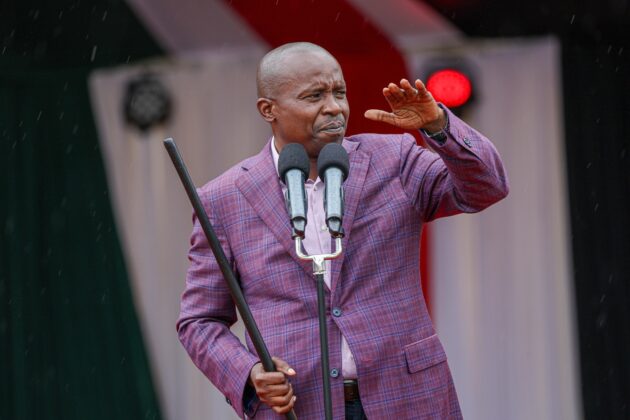
No Plans to Cut Funding for Free Education, DP Kindiki Assures » Capital News
KANDUYI, Kenya, July 26 – Deputy President Kithure Kindiki has assured Kenyans that the government remains firmly committed to funding free primary and secondary education, dismissing fears of any budget cuts to the critical sector.
Speaking on Saturday during the Kanduyi Constituency Economic Empowerment event at Posta Grounds in Kanduyi town, Prof. Kindiki reaffirmed that the Kenya Kwanza administration will not roll back gains made in expanding access to basic education. He cited increased budgetary allocations and a record number of teacher recruitments as evidence of the government’s commitment since President William Ruto took office in 2022.
“The Kenya Kwanza Administration will go out of its way to ensure we do not reverse the gains the country has made in providing free and compulsory primary and secondary education,” said Kindiki.
This financial year, the education sector has been allocated over Sh700 billion—one of the highest budgetary provisions in recent years. The funds are expected to enhance infrastructure development and improve teacher remuneration, particularly under the new competency-based curriculum.
“Former Presidents Mwai Kibaki and Uhuru Kenyatta laid a strong foundation in education reform. We are building on that legacy, and we cannot afford to take a step back. Now more than ever, we must continue making education accessible and affordable for all Kenyan children,” he added.
Kindiki revealed that 76,000 teachers have already been employed and an additional 24,000 are set to be recruited by the end of the year. With the 100,000 new teachers, he said, the long-standing staffing gaps in public schools are being addressed significantly.
“Ignore the naysayers. I assure you that we are implementing interventions to ensure education is affordable, accessible, relevant, and of high quality,” the Deputy President emphasised.
Kindiki also defended the ongoing nationwide economic empowerment forums, clarifying that they are designed to support registered groups, not individuals, through structured investment initiatives.
“These empowerment forums are meant to uplift organised groups and Saccos by enabling them to invest in income-generating ventures—not to distribute money for political mileage,” he said.
Turning to development, the Deputy President outlined ongoing efforts to boost agriculture, infrastructure, healthcare, and electrification across the country. He cited the revival of Mumias Sugar Factory, now paying farmers weekly and settling salaries and bonuses on time, as a success story being replicated in other factories across Western and Nyanza regions, including Nzoia Sugar in Bungoma.
The government has also resumed construction of key road projects, including the 63km Musikoma–Navakholo Road and the Misikhu–Brigadier Road, which are critical to regional trade and mobility.
Additionally, 26 modern markets are under construction in Bungoma County, including facilities in Bungoma town, Chwele, Naitiri, Kapsokwony, and Cheptais.
“Nothing stands in the way of Kenya moving from a lower-middle-income economy to a fully middle-income country by 2030. Access to electricity, water, roads, dignified housing, and quality healthcare will help us get there,” Kindiki stated.
The event was attended by a high-powered delegation including National Assembly Speaker Moses Wetang’ula, Bungoma Governor Ken Lusaka, Deputy Governor Janepher Mbatiany, and Presidential Aide Farouk Kibet. Also present were Senate Majority Leader Aaron Cheruiyot, Kanduyi MP John Makali, and lawmakers from across the country.